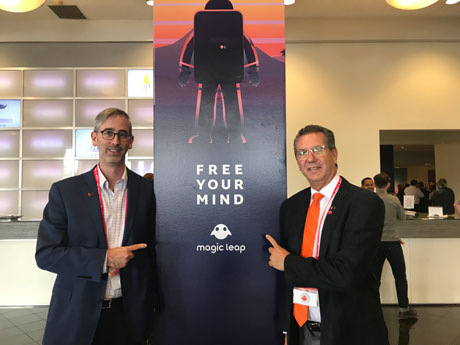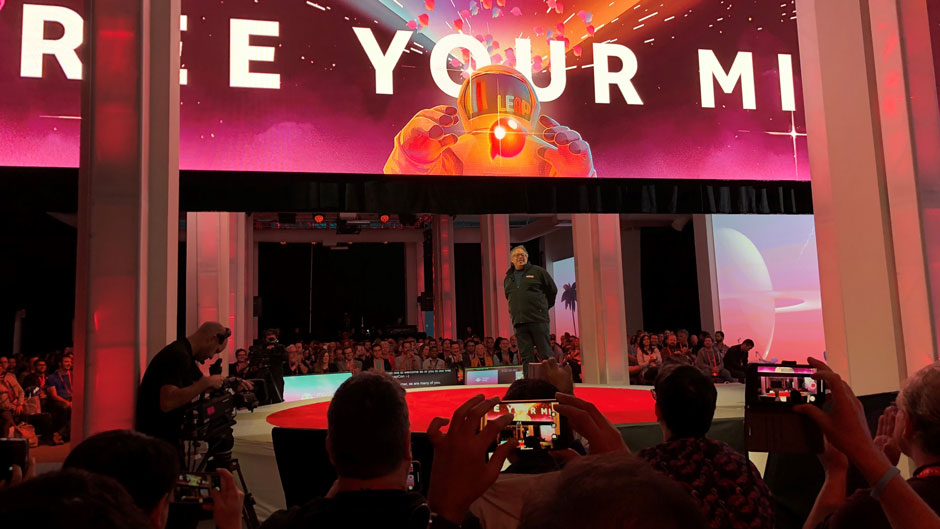LOS ANGELES—Imagine a world you control. A place where you step into a reality somewhere between the here and what you want it to be.
You could immerse yourself in games or walk the sidelines of live sporting events while sitting in your livingroom. Build complex designs simultaneously and collaboratively with architects and engineers while sipping lattes in a coffee shop. Peek inside a three-dimensional image of a brain or vertebrae to advance research and discovery in medicine and health sciences.
Through a pair of technologically advanced glasses that you wear, you can decorate your home with virtual products—couches, desks, and chairs—plucked from the ether with a light saber and placed anywhere you want them to be. If you like the way it looks, you can buy.
Why would you ever want to use a website again?
That is part of the vision of Magic Leap, the Plantation, Florida-based company founded by Rony Abovitz, B.S.M.E. '94 M.S.B.E. '98, who has raised billions of dollars in funding to develop the new technology known as “mixed reality.”
In its first-ever developer’s conference in Los Angeles this week, Abovitz and a host of Magic Leap experts and partners added shape and context to the ever-shifting reality they are pioneering. It’s called “Magicverse,” considered “a system of systems bridging the physical world and the digital world.”
“I’m a dreamer as are many of you,” said Abovitz, CEO of Magic Leap. “We’re building a piece of a much bigger picture.”
How best to understand this? Sitting in an elegant restaurant, you are surrounded by beautiful decorations, bringing you joy and comfort. Over each door, however, are stark red exit signs, required by safety regulations. Each can be considered a “verse” or layer in your environment. Once you walk outside, you look for transportation options, again another layer to your “verse.”
In coming years, urban cores will build out their Magicverse by adding layers in mobility, entertainment, utilities, health and wellness and other areas. These layers, or digital maps, are created through spatial computing methods. Magic Leap, through its unique glasses, is providing the software and browser glue to marry the physical and digital worlds and showcase the layers to the user.
“A university in and of itself is a verse,” said John Gaeta, senior vice president for Magic Leap best known for his virtual cinematography work on the Matrix movie trilogy. “Verse can be anything.”
And that prospect is exciting and energizing to the University of Miami leadership, who applauded the academic partnership with Magic Leap that was announced during the keynote address Wednesday.
“The transformative technology of Magic Leap affords us a unique opportunity for our faculty and students to participate in defining the future in virtually any field or discipline,” said Jeffrey L. Duerk, executive vice president and provost.

Duerk attended to the two-day conference with UM colleagues Josh Friedman, senior vice president for development and alumni relations, and Jean-Pierre Bardet, dean of the College of Engineering.
“All UM students will get to experience first-hand the computational cognitive revolution that is about to transform everyone’s daily life,” said Bardet. “They will be immersed and relive battles of the civil war, follow in the footsteps of ancient explorers, swim among blue whales, or explore DNA strands. They will probe actual information mixed with virtual objects placed into real environments.”
Friedman said Abovitz and his company “represent the best of Miami innovation” and is a true success story.
“Magic Leap is a natural partner for the University of Miami,” Friedman said. “Both have a deeply engrained entrepreneurial spirit, and both seek to push boundaries.”
The University and Magic Leap are expected to announce further details of its partnership in November.
In addition to the UM announcement, Magic Leap and AT&T said it will work together on ways to use spatial computing to bring new entertainment experiences to customers, such as virtual television in your livingroom. The new experience, through DirecTV and utilizing the Magic Leap One glasses, will debut in 2019. AT&T will also install its 5G digital speed zone at the Magic Leap campus in Plantation.
During the two-day event, hundreds of developers and content creators got to experience demonstrations from Magic Leap partners on how the Magic Leap One glasses can be used to create new worlds or enhance product delivery and exploration. In turn, developers shared some of the content they have created utilizing the technology featured through the glasses, which were released to developers this summer.
“The place you can get to,” Gaeta told conference attendees, “is not necessarily a place you are at.”

